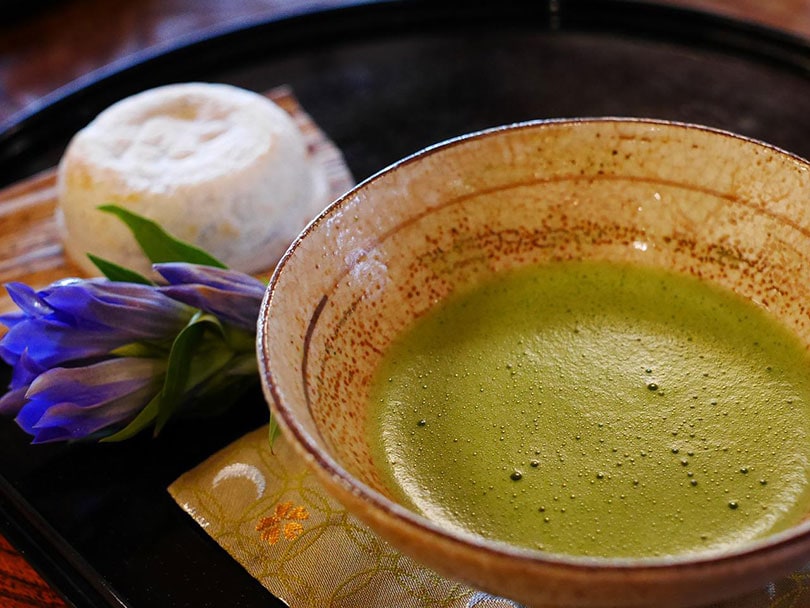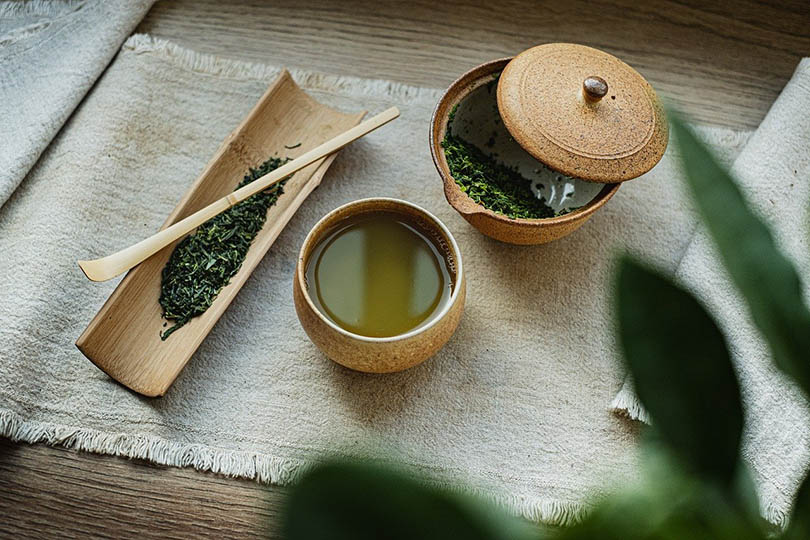
Tea, whether it’s iced, hot, green, black, or herbal, is loved around the world. While it used to not be as popular in America, it is recently taken hold, not only for its taste but its health benefits as well. Now that it’s popular in America, tea drinkers are starting to ask questions, and we have the answers.
Today, we’ll discuss the differences between green tea and black tea. Both of these teas come from the leaves of the Camellia sinensis plant, and both have health benefits and risks associated with them. We’ll talk about those aspects and more as we compare green tea and black tea, so you don’t have to.
Overview of Green Tea:
Green tea is one of the most popular beverages in the world. It is processed to prevent oxidation, which gives it a light color.
Green tea is also made from the first leaves of the plant. Once the tea is dried, it is portioned into tea bags or loose tea and released to the public for purchase.

Caffeine
While it’s hard to calculate precisely how much caffeine green tea has, it’s said to have approximately 28 mg of caffeine per 8-ounce cup of tea. If you compare tea to coffee, a cup of green tea in the morning is the same as a smaller cup of coffee, which contains more caffeine.
Taste
Green tea is usually a lightly flavored tea with fresh notes of hay and underlying notes of grass. According to the steeping process and the tea itself, it is a green or yellow color and can be astringent or sweet.
If you use boiling water to make your green tea, it’ll make it slightly bitter. If you allow the water to cool a bit before pouring it over your tea, you’ll get more of that sweet taste you love.
Health Benefits
Green tea has quite a few natural health benefits. One is that it works as a natural mood booster. The tea contains theophylline, which is a natural stimulant that can be likened to caffeine. So, a cup of green tea can help you stay alertand more focused, just like a mug of coffee.
Green tea may also help protect the body against certain types of cancer by washing out certain toxins in the body. It’s also said to lower the risk of heart disease, help the body absorb more nutrients, and relieve stress, which most of us already know.

Risks
As with anything else in the world, where there are health benefits, there are also risks.
Caffeine sensitivity is one of the most common risks associated with drinking green tea. If you have caffeine sensitivity, you could end up experiencing symptoms of nausea, upset stomach, irritability, insomnia, and anxiety. If you experience any of these symptoms, stop drinking the tea right away.
Drinking too much green tea may lead to liver damage, but that’s only in rare cases.
- Contains a small amount of caffeine
- Is a great stress reliever
- Can cause caffeine sensitivity
- In rare cases causes liver damage
Overview of Black Tea:
The biggest difference between green tea and black tea is that black tea is oxidized. Once the leaves are picked, they are allowed to wither and oxidize before being packaged for sale. This process alters the flavor, health benefits, and even the antioxidants of the tea, making it quite different from green tea.

Caffeine
Black tea contains around 48 mg of caffeine, which is more than green tea.
Taste
Black tea features a balanced flavor profile. The flavor is rich and malty instead of grassy, and it has more body, depth, and strong notes of tannin. If you love a good, strong mug of coffee, then you’ll enjoy the bold taste of black tea over green tea in most cases.
Health Benefits
Black tea comes with its own health benefits, including being an antioxidant and helping with oral health. It can also lead to lower blood sugar levels, reduce the risk of diabetes, and give your immune system a boost.
Drinking black tea can also control and lower your stress levels, strengthen your bones, maintain a healthy digestive system, and provide an energy boost when you need it. Those are only a few of the health benefits of drinking black tea, so next, we’ll go into the possible risk of drinking this fragrant blend as well.

Risks
As with green tea, there are benefits, and then there are side effects and risks.. Let’s look at the risks drinking black tea can bring you.
Many users have experienced anxiety and problems sleeping after drinking black tea. Headaches, faster breathing, nausea, vomiting, and high blood pressure have also been reported. If you feel yourself having any of these symptoms, it’s best to stop drinking the black tea. If the symptoms persist, it’s important to talk to your doctor for and treatment options.
- Has a balanced flavor profile
- Relieves stress
- Contains more caffeine than green tea
- Can cause high blood pressure
Which One Should You Drink?
When comparing green tea and black tea, each has its health benefits, and each has its risks. While both contain caffeine, black tea usually contains more than green tea.
Green tea has a lighter, grassier flavor, while black tea has a bolder flavor that’s more akin to coffee.
If you’re looking for a caffeine boost, black tea is your best bet. However, if you’re searching for the tea that will give you the most health benefits, you can examine the advantages of both teas and determine which one is the most beneficial to you.
If you’re drinking teas just because you love the taste, then either type will do.
Conclusion
This concludes our guide on green tea vs. black tea, the health benefits, caffeine levels, and the risks involved in drinking both. Both are good for you, have different flavor profiles, and have various risks. The choice of which tea is right for you can only be answered by trying them both, then making the final decision on which one you enjoy the most.
Interesting Read:
- Caffeine vs. Alcohol: Comparing the Effects on Your Body and Mind
- Caffeine in Green Tea vs. Coffee: Which Has More? By How Much?
Featured Image Credit: Left – Green Tea (Maik Kleinert, Pexels) | Right – Black Tea (WebTechExperts, Pixabay)















